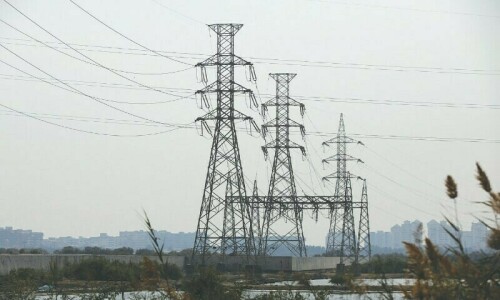IN the final year of the Iran-Iraq war, Ayatollah Khomeini faced a dilemma: whether to bend to domestic and international pressure and accept a ceasefire or continue with the increasingly futile “holy defence” that was bringing heavy casualties. Opting for a ceasefire remained a “red line” in official discussions, and only one man could change that — the founder of the Islamic republic.
In the end, Khomeini decided — in his own words — to “drink from a poisoned chalice” and face up to the unpalatable reality. By agreeing to a UN-brokered truce, he put an end to the longest conventional war of the 20th century.
In today’s Iran, the current supreme leader, Ayatollah Ali Khamenei, is in a similar situation. With the standoff over Tehran’s nuclear programme causing discontent at home and fears of a major confrontation with the west, will Khamenei be prepared to compromise?
Until recently, talk of sanctions having an impact on the Iranian economy has been a “red line” for Khamenei. During his 23-year rule, he has said sanctions have made his regime stronger and self-sufficient in many areas. Those officials who suggested sanctions were making life more difficult were immediately attacked.
This week, Khamenei was still confident that sanctions would not bring his regime to its knees. But last week, his official website ran an article that referred to Imam Hassan, a revered Shia figure famous for peace-making, triggering speculation that Khamenei might finally engage in serious negotiations.
Iran’s president, Mahmoud Ahmadinejad, speaking at a press conference last week after Iran’s currency hit an all-time low, made clear that sanctions were taking their toll but claimed his government had done nothing wrong, implying that the current situation was the consequence of a policy out of the control of his government.
Although Ahmadinejad is the public face of Tehran’s regime, sensitive domestic and foreign policies, including that of the nuclear programme, are under the direct control of the supreme leader and his Revolutionary Guards. In his talks with the world’s major powers, Saeed Jalili, Iran’s chief nuclear negotiator, has also made clear he is the representative of the supreme leader.
Last month, Mohammadreza Bahonar, the deputy head of the Iranian parliament, said Iran was only selling 800 barrels of oil per day mid-summer, in comparison to 2.3 million barrels per day last year. The dollar is now worth three times the rial compared with early last year.
Any decision over Iran’s nuclear programme rests with Khamenei who finds himself caught between two factions inside the regime, a small hawkish group pushing for more nuclear “advances” and a majority shy to show opposition. It emerged recently that an internal report by the Revolutionary Guards suggested that Iran needed only to resist “three more years” under sanctions to achieve its nuclear goals.
In 2005, Khamenei resorted to issuing a fatwa to reassure the international community, without success, that his country was not making a nuclear bomb. Now he needs to make a far tougher decision. — The Guardian, London











































